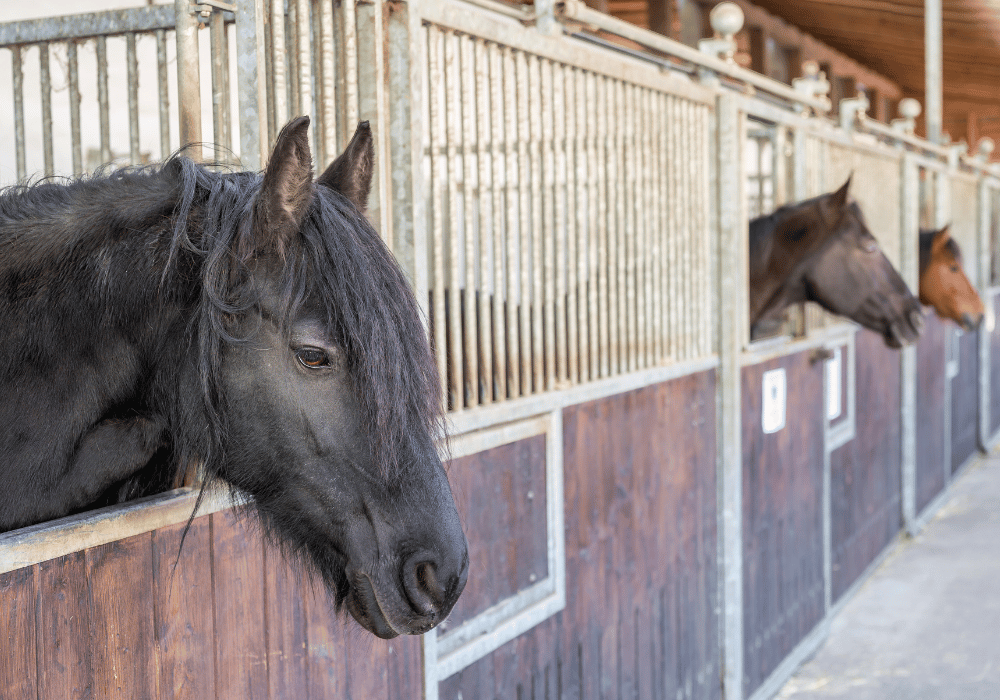There are not many things that strike fear in a horse owner more than knowing that their horse has colic. Colic can be fatal, and owners can be faced with some very difficult decisions. This is no surprise, given colic is a leading cause of emergency veterinary callouts and equine deaths worldwide. However, understanding the different types of colic, being able to recognise the symptoms and knowing what to do if you suspect colic can help you to stay calm and manage the situation.
Understanding the different types of colic in horses - and their causes - can help you to prevent colic and take action when it does strike. This blog article outlines the five main types of colic in horses, along with symptoms, causes and treatment options.
What is Colic in Horses?
The word ‘colic’ actually just refers to abdominal pain, as opposed to a specific condition. Horses can have colic for a number of reasons, and there are a range of different types of colic in horses. Colic can affect any horse at any time, although there are ways to minimise the risk of it happening.
Types of Colic in Horses
There are five main types of colic in horses; spasmodic, impaction, sand colic, displacement and strangulation. Each type of colic has different causes and symptoms, and it can be difficult to know what type of colic your horse is experiencing without a veterinary examination.
Spasmodic Colic
Spasmodic colic equates to a large percentage of colics in horses. This type occurs when the bowel is contracting in an abnormal manner, resulting in the horse experiencing painful spasms. Gut sounds are often increased, as this is the result of an over-active system, as opposed to an under-active system. It is often the result of a dietary change, such as the move to very lush grass.
Gas Colic
This is caused by a build-up of gas in the horse’s intestine. This type of colic can cause the horse to look bloated, and it can be caused by a diet which is too high in sugar or starch. Sudden changes in diet can also lead to gas colic. Provided there is no displacement or obstruction, this can usually be resolved with non-invasive medical treatment.
Impaction Colic
Impaction colic is, as the name suggests, a blockage in the digestive system. This may be due to dehydration, dental problems giving rise to issues chewing or problems within the digestive system. This is another fairly common type of colic and can usually be resolved with oral fluids, although more severe impactions will require intensive care.
Displacement Colic
Displacement colic occurs when a section of the digestive system is moved to another location. This may be due to a build-up of gas or an impaction. Intensive care and medical management can resolve some displacements, others may require surgery.
Sand Colic
If a horse is turned out on dry and sandy soil, they may consume sand whilst they are grazing. Over time, the sand accumulates in the horse’s large colon causing damage and pain. Most cases can be managed medically with oral and intravenous fluids, and intensive care, some will require surgery.
Strangulation Colic
If the horse’s gut becomes twisted, strangulation colic can occur. This is when a portion of the gut is strangled and the blood supply cut off. This type of colic is incredibly serious and will almost certainly require surgical intervention. The horse is likely to become systemically ill, due to the toxins being released into their bloodstream.
Colic Treatment & Surgery at Avonvale Equine Vet Practice
Whilst the symptoms, causes and treatments for each of these different types of colic vary, they all have one key thing in common: all require immediate veterinary attention. Colic is a veterinary emergency and you should always contact your vet immediately if you suspect your horse may have colic.
Avonvale Equine Vet Practice are available 24/7, 365 days of the year for emergency call-outs. Our emergency call-outs are covered by our own vets, so you will always see an Avonvale vet no matter what time of day or night you require us. Our Ratley clinic is equipped with full surgical facilities, enabling us to carry out emergency colic surgery. Furthermore, our in-patient facilities are managed by our experienced equine veterinary nursing team, so your horse is in safe hands should they need to stay with us overnight. Register your horse, pony, donkey or mule with us today.








